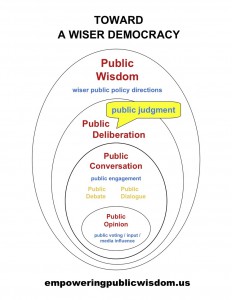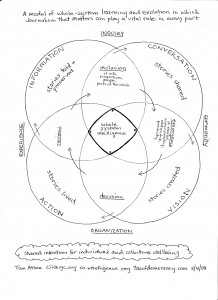
Collective thinking about public affairs
(NOTE: In this essay I intentionally subsume the thinking processes of official decision-makers into the thinking processes of the citizenry as a whole. I realize that official decision-makers can and do make decisions independently of the will of the people, unless that public will is united and organized. But elite decisions made independently of the public do not qualify as “public thinking” – at least in any democratic sense – and in this essay I am attempting to explore the nature of public thinking so that it can be upgraded and empowered to impact public policy. So here we will look at the thinking processes of the entire population and mini-publics thereof as they go about living a relatively democratic life.)
How can we think clearly about the collective thinking processes of a whole population in a democracy? How do populations reflect on public issues and come to conclusions about collective action and public policy? What follows is one framework for sorting out the different dimensions of public thinking and the quality of that thinking process.

The most basic form of public thinking is, of course, what goes on in the minds of individual citizens as they think about public affairs. We see manifestations of this – commonly called “public opinion” – in polls, in voting, in online “citizen input” sites, and in various other visible forms of citizenship that reflect the opinions of individual citizens in the population as a whole.
Public opinion evolves in a message-rich environment that includes – at the next higher level of public thinking – news media and commentaries from pundits and partisans, on talk shows and blogs, and in online forums, letters to the editor, and public hearings. This public thinking often takes the form of mediated or witnessed conversations: Diverse (often polarized) voices express their views to each other while being directly or indirectly witnessed by the public. Our society depends heavily on this kind of media-driven interaction to collectively reflect on its public issues and shape the views of its citizens and decision-makers.
This conversational swirl of expressiveness usually takes the form of a debate – a contest among views and proposals attempting to win support. This societal debate includes partisan advocacy and activism, with all its TV ads, viral videos, street demonstrations, and lobbying. Less often, commentaries by experts and partisans get presented in the context of a dialogue intended to provide greater understanding, with questions taking participants and viewers deeper into the issues, where clarity and common ground often lie, rather than merely highlighting the discord. In any case, media and conversations among presumed authorities are influential factors in the collective intelligence or folly of a whole community or society.
Moving into a more engaged form of public thinking we find ordinary citizens involved in conversations with each other rather than passively witnessing the declarations of spokespeople. In its informal mode, we find people talking around dinner tables and water coolers, over coffee and backyard fences, in bars and busses. We also find such conversations unfolding in more formal settings like moderated online forums and facilitated face-to-face public engagements. Some conversational designs can reduce polarization between participants' political positions and thus increase their ability to learn and change their minds in ways that better serve their own values. Organized public conversations can be set up to be witnessed by the general public. Through the public thinking processes of both informal citizen conversations and more organized citizen engagements and public participation, people's views shift in various ways that can aggregate into shifts in overall public opinion.
To the extent participants in such a conversation are diverse – and to the extent they are able to reflect together on a full and balanced range of views, information, proposals and values – their conversation can be considered deliberative. Such public deliberation is the next higher form of public thinking, being more carefully informed and thoughtful than the usual debates and dialogues. However, being also a form of public conversation, public deliberation has all the qualities mentioned regarding earlier forms of public conversation. As with debate and dialogue, public deliberation can be informal or formal and can shape public opinion as participants and witnesses shift their views on the topic being discussed.
At the top of this ladder of public thinking is public wisdom. This refined and expanded form of public deliberation and judgment takes into account more than is commonly dealt with in the mainstream political discourse on a subject. With a big-picture, longer term perspective, it seeks more broadly beneficial outcomes than are commonly considered by the the vast majority of citizens, pundits and policy-makers. Public wisdom emerges from efforts to lift public judgment beyond “short-term solutions to specific problems in order to satisfy those people and interests directly involved”. Public judgment becomes an expression of public wisdom to the extent its thinking, feeling, and process embody characteristics such as the following:
- It is longterm. It considers future generations and is prudent, visionary, ongoing (or iterative), and historically aware…
- It is systemic. It considers inter-relationships, wholeness, feedback dynamics, contexts, structures, processes, narratives, power dynamics, ecology and health…
- It is inclusive. It creatively embraces diverse people, needs, interests, intelligences, perspectives, information, species, generations…
- It is humble. It takes the limits of its knowledge seriously to fuel deeper exploration and caution rather than short-circuiting into inordinate certainty and hubris…
- It is appreciative. It notes what works and it transmutes negative situations and perspectives into positive possibilities…
- It is empowering. It encourages, promotes, taps into and creatively uses the self-organizing capacities and vitality of life…
- It is engaging. It taps the diversity of humanity and uses the synergistic power of participatory interaction…
- It is evolutionary. It consciously joins in the ongoing development of the world and of individual and collective consciousness…
This tentative list offers examples of qualities that can lift a deliberative process beyond a narrow problem-solving focus that might overlook factors that could undermine success or cause unanticipated harms further down the road. From the broader perspectives of public wisdom we can create solutions that have a better chance of being both broadly beneficial and sustainable.
We already know much that can help us generate public wisdom. Further research and development could identify even more practical steps that could make our public engagements and public policies increasingly wise over time. With such knowledge we can significantly improve the longterm prospects for our communities, our societies, and our civilization as a whole, especially in these times of rapidly emerging crises with their accompanying opportunities for positive learning and transformation.
See Also:

Tom Atlee, Empowering Public Wisdom: A Practical Vision of Citizen-Led Politics (Paperback)
Tom Atlee, Empowering Public Wisdom: A Practical Vision of Citizen-Led Politics (Kindle)
Tom Atlee, Reflections on Evolutionary Activism: Essays, poems and prayers from an emerging field of sacred social change (Paperback)
Tom Atlee, The Tao of Democracy: Using co-intelligence to create a world that worlds for all (Paperback)



